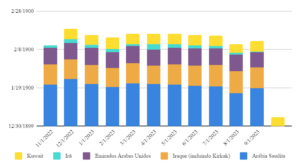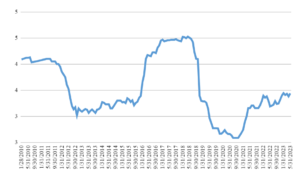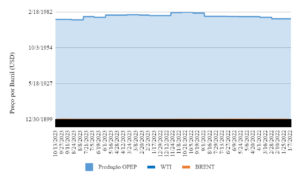The Strait of Hormuz: The energy market in a state of alert
The current conflict in the Middle East intensifies risk in the global energy market, with possible impacts on the Strait of Hormuz.
The conflict between Israel and Hamas in the Middle East, which began on October 7, could impact the Strait of Hormuz. This region is crucial for the strategic transportation of a large chunk of global oil production.
The war has introduced a new element of volatility into international commodity markets and upped the probability of affecting global energy security. Since then, the energy sector has remained on alert due to potential developments.
Keep reading to find out:
- What is the Strait of Hormuz, and why is it so important?
- How could war impact the Strait of Hormuz?
- What is the key role of hedging in current energy markets?
What is the Strait of Hormuz, and why is it so important?
The Strait of Hormuz is the channel that connects the Persian Gulf with the Gulf of Oman, and by extension, the Indian Ocean. Located between Iran and Oman, it’s one of the main routes for some of the planet’s largest oil exporters. Thus, it’s an extremely strategic maritime route.
The strait’s importance lies in the fact that it’s a transit point for the shipment of oil and natural gas from the Persian Gulf countries to international markets. It’s estimated that around a fifth of the world’s crude oil production flows continuously through the Strait of Hormuz.
In other words, this percentage is equivalent to around 17 million barrels of oil per day, according to the most recent data from BNN Bloomberg. Hence, any event in this region can be reflected in the prices of gasoline and diesel, causing an impact on the whole planet’s economic situation.
Cumulative monthly shipping of crude oil from the Middle East (millions of barrels)

Source: hEDGEpoint Global Markets
Alternatives to bypass the Strait of Hormuz are limited. Only Saudi Arabia and the United Arab Emirates have pipelines that can move crude oil out of the Persian Gulf. In addition, only these two countries have additional shipping capacity to get around the Strait of Hormuz.
-
Learn how the use of oil has evolved, and how relevant the commodity is in the world.
How could the war between Israel and Hamas impact the Strait of Hormuz?
The war between Israel and Hamas has sparked fear in the energy market, worsening risk aversion. Assets such as commodities should feel the effects, especially if Iran gets involved. That country’s entry into the conflict could significantly increase tensions and adversely affect the Hormuz maritime passage.
Iran is one of the major producers and exporters of oil and natural gas in the Middle East. The nation is already subject to Western sanctions that could be increased, making it more difficult for Iranian oil to be traded. The result? Increased energy costs for the entire market.
The combination of the high demand for oil and the limited supply, due to OPEC+ (the Organization of Petroleum Exporting Countries) actions, has created a favorable environment for Iranian oil. The country increased its market presence due to key factors such as the greater demand from China.
In recent years, Iran has managed to circumvent Western sanctions and has significantly stepped up its exports. To achieve this, it’s applied techniques that make it difficult to trace the origin of its oil.
If it enters the war, there could be interruptions in the Iranian supply and the threat of even blocking the Strait of Hormuz. In times of geopolitical tension, this measure is a recurring one used by the Iranian government. If this does happen, supply will be further reduced, accentuating price escalation.
Iran’s oil production

Source: hEDGEpoint Global Markets
How could the high price of petroleum cause global inflation?
Such a block of the Strait of Hormuz, even if temporary, could lead to substantial increases in total energy costs and trigger global inflation. The energy market is already quite restrictive. If the value of oil rises, prices will surely come under pressure.
Surging prices are a challenge for monetary authorities seeking to tame inflation. This happens because oil is a basic input for the transport of goods and services, in agriculture as well as manufacturing. Production costs would rise, with ripple effects also felt by consumers.
Top Oil Futures (USD)

Source: hEDGEpoint Global Markets
In recent weeks, inflation data shows that consumer prices rose 0.4% in September, above the market consensus of 0.3%. This bullish surprise has contributed to a greater dissipation of risk aversion. Moreover, the prospect of an increase in U.S. interest rates, and the consequent strengthening of the dollar, impact investors. This is because emerging countries’ currencies lose strength.
-
Read also: How does volatility impact commodity markets?
What’s the role of hedging in energy markets?
So far, we’re only at the start of this war, and there’s no way to accurately anticipate upcoming developments. However, we’re already experiencing the context of a notable increase in volatility, particularly related to oil prices.
In this case, there’s a good chance that inflation will increase soon as a consequence of energy cost hikes. Hedging plays a fundamental role in risk management in the global energy market chain. To achieve this control involves the use of mechanisms capable of protecting energy market participants from adverse price variations.
hEDGEpoint totally understands this sector and the use of hedging instruments. We’re well aware of the global scenario while analyzing all possible consequences to assist you in making better decisions.
Talk to us today to learn how we can help your business.






